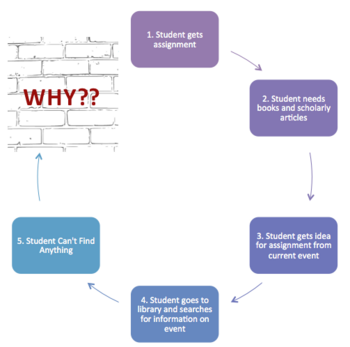Library:Module 5 Publishing Life Cycle
5.1 The Publishing Life Cycle
For this module we will take a step back and discuss information sources themselves. This may not appear to be as important as finding information, but if you don't know the different kinds of information, and don't understand how it is created and published, you will not be able to select the best sources for your research. This can result in more poorly written assignments on your part.
The Assignment Life Cycle

While this whole module is about information sources, this section will discuss information and how it is managed over time--but first, let's look at your assignment life cycle.
When you get an assignment you will usually be directed by your professor to find a specific number of resources (e.g. books, articles) for your topic. Sometimes you'll be given a topic and sometimes you will have to develop your own. As covered in Module 1, you will get ideas for your topic from reading course materials, books, articles and internet sources and you will select something that interests you. Often what interests us are current events. Current events provide us an interesting space for research but can cause some problems.
Once you have a topic you will begin your research, but then you might hit a brick wall. There may be no information about your topic, and you must then ask yourself why? Knowing why will help you not only select a better research topic before you begin your assignment but also manage your expectations when searching for material. We will also give you some tips on how to work around this issue without having to start again.
First, let's figure out the "why" of finding the information.
The Information Life Cycle

Just like your assignment, information works within a cycle that is determined by several factors. The Information Life Cycle can begin with a newsworthy event. Once this event occurs, the information about the event enters the cycle:
- Day 1 - An event occurs and is reported on the web, radio and television.
- Day 2-3 - Journalists write articles and publish in newspapers.
- Day 3-14 - Journalists write lengthier articles and publish in popular magazines.
- Months - Scholars perform intensive research and analysis on the event. An academic article is written and the process of editing or peer review begins. This can take a lot of time as several versions of the article will be reviewed and modified before publication.
- Years - Scholars will perform intensive research and analysis of the event and how it is situated in larger theoretical and global perspectives. This will take a lot of time as it will require several versions of the book to be reviewed and modified before publication, marketing and additional publication processes before it is ready to be accessed.
As you can see, if you have selected a current event for your research paper, attempting to find a scholarly source within a few months of the event will be impossible. Does this mean you can't write on the topic? Of course not! It will just make the research process a little different.
To write a research paper on a current event, you can research an event that is similar. For example, if you are interested in the environmental impact of an oil spill that occurred a few days ago, look for oil spills that have occurred in the past and discuss the current event by generalizing. For assistance with this process, go to a research help desk at your library.
|
Note - If a research paper is not event driven, for example an article on mineralogy in British Columbia, the publication cycle may take less time BUT the process of peer review is always a lengthy one. You will learn about peer review later in this module. |